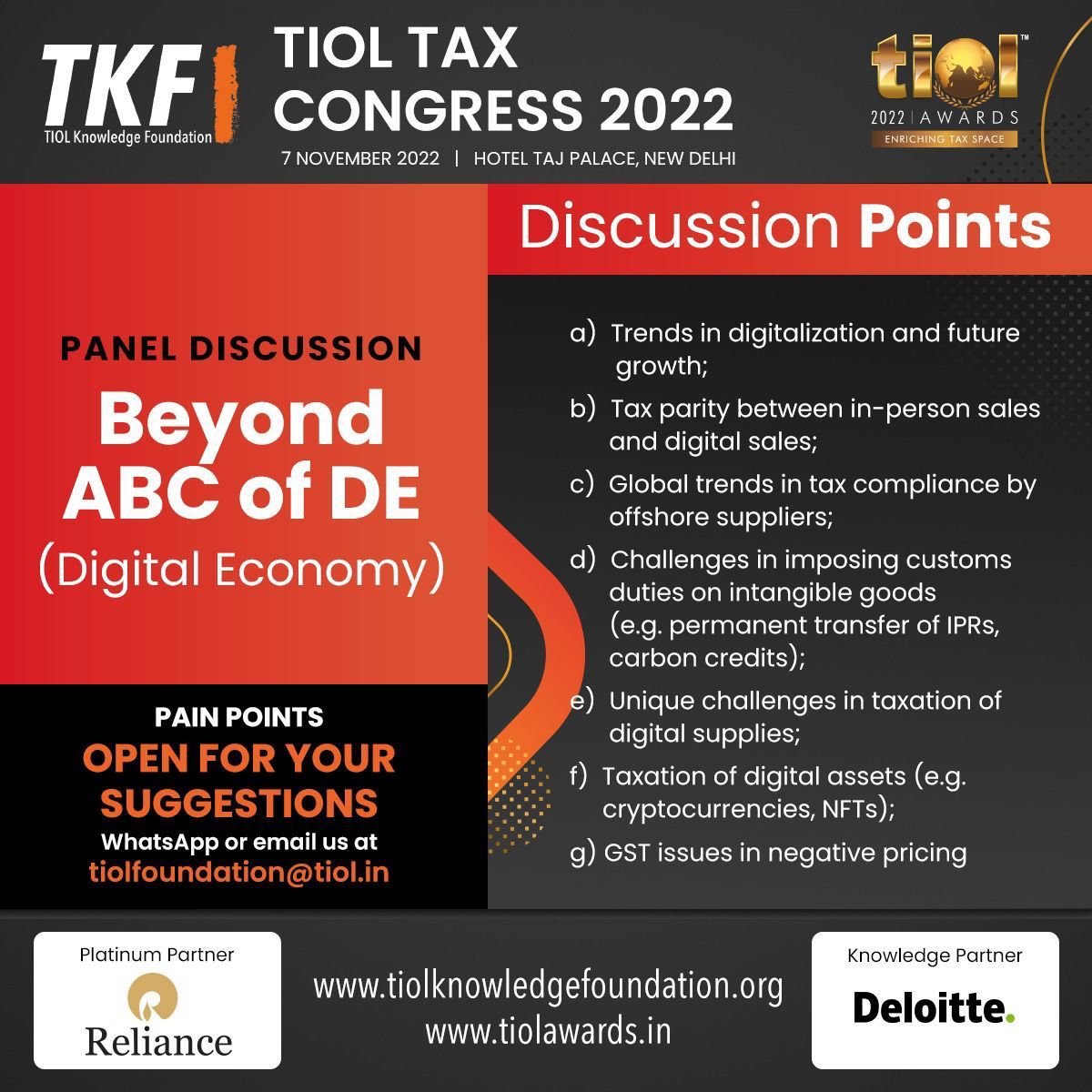2022-TIOL-617-CESTAT-DEL
Vandana Global Ltd Vs CCGST, CE & C
CX - The issues to be adjudicated are; whether the amount of mandatory deposit at the time of filing appeal before CESTAT is 10% of duty and penalties or just 2.5% of duties and penalties added to pre-deposit of 7.5% thereof already made before Commissioner (A); whether the sanctioning authority can order adjustment/set off the amount of refund against arrears towards assessee - Appellant had paid the amount of pre-deposit at the rate of 10% of duty and penalty while filing appeal before the CESTAT over and above the 7.5% thereof as was paid while filling appeal before Commissioner (A) against O-I-O pursuant to SCN in terms of Circular No. 984/8/2014 - Said Circular stands superseded vide Circular No. 1/5/2015 - Since the Circular of 2018 was not applicable at the time when the appeal before CESTAT was filed by appellant in year 2016-17 and as per the then prevalent provisions appellant was supposed to deposit 10% of duty and penalty amount without including the amount of pre-deposit made by him before Commissioner (A), that the appellant made a pre-deposit of 17.5%, accordingly - Said deposit qualifies to be called as pre-deposit under Section 35F of Central Excise Act, 1944 - The Larger Bench of Tribunal vide order reported as 2017-TIOL-1414-CESTAT-DEL-LB had held that under Section 35F ibid and under Section 129E of Customs Act, 1962, assessee is required to make separate pre-deposit of 10% of amount of duty confirmed/penalty imposed for preferring a second appeal to Tribunal against order of Commissioner (A) - Keeping in view the said prevalent situation at the time when appellant herein made a pre-deposit of 17.5%, his refund claim pursuant to setting aside of demand/penalty has to be sanctioned with the interest at the said deposit @ 17.5 % of duty and penalty deposited instead of sanctioning the refund of mere 10% of duty and penalty - Adjudicating Authority below is held to have committed an error while not sanctioning the refund claim of entire amount of pre-deposit i.e. @ 17.5% of duty and /or penalty involved, that too, along with the interest. With respect to second point of adjudication, recovery of sums due to Government is dealt with under section 11 of Central Excise Act, 1944 - The said section has undergone an amendment in year 2013 - The Order under challenge has been passed after the amendment in section 11ibid - Adjudicating Authority has no power to order adjustment as there no more remains the specific provision authorizing him to adjust any sanctioned amount/ refund towards any other amount due to Revenue - There exist no other provision in the Act which enables the Revenue to adjust the amounts due to them as against amounts due by them to the assessee - The High Court of Karnataka in case of Stella Rubber Works (Unit-II) 2011-TIOL-325-HC-KAR-CX has held that once the Adjudicating Authority holds assessee entitled to refund of amounts which he had paid to Department, in absence of specific provision authorizing Revenue adjusting the said amount due towards them, it shall be improper for them to make such adjustment - Accordingly, adjudicating authorities below have committed an error while ordering adjustment of amount of Rs. 2,43,608/- from sanctioned refund of Rs. 8,72,425/- - The amount disbursed of Rs. 6,64,357/- is therefore held to be a short disbursement: CESTAT
- Appeal allowed: DELHI CESTAT
2022-TIOL-616-CESTAT-AHM
Brightpoint India Pvt Ltd Vs CC
Cus - The appeals are filed against impugned order whereby, Commissioner (Appeals) has rejected the appeal on the ground that once the reassessment of bill of entry is finalized they cannot file appeal before Commissioner (Appeals) - The Commissioner (Appeals) has not given any finding on merit on the ground that reassessment is not possible once the bill of entry is self assessed - This issue has elaborately been dealt with by Supreme Court in recent judgment in ITC Ltd. 2019-TIOL-418-SC-CUS-LB - In view of said judgment, it is mandatory that if an assessee wants to challenge the assessment of bill of entry, he should file appeal before Commissioner (Appeals) as the assessment of bill of entry is appealable order therefore, Commissioner (Appeals) should not have rejected the appeal on the ground that the reassessment is not possible, he should have passed the order on merit - Accordingly, the impugned orders are set aside and appeals are allowed by way of remand to pass afresh order on merit: CESTAT
- Matter remanded: AHMEDABAD CESTAT
2022-TIOL-615-CESTAT-DEL
Auto Gas India Vs CC
Cus - The issue involved is, whether the differential duty of customs has been rightly demanded for extended period of limitation, along with imposition of penalty, on allegation that appellant should have paid customs duty based on MRP, whereas the appellant have paid customs duty on transaction value - Only allegation in SCN for invocation or extended period of limitation is that, appellant have filed two Bills of Entry wherein they have suo motu declared RSP of goods for purpose of calculation of CVD at the time of import - Prior to this, appellant had not declared RSP with intent to evade Customs duty - It is mentioned in SCN that investigation was started by department only after declaration of MRP/RSP suo motu by appellant in Bill of Entry filed in October, 2009 and subsequent Bills of Entry - The statement of proprietor was recorded under Section 108 of Customs Act, 1962 on 08/12/2009 wherein, he inter alia stated that although they are importing from year 2004 they have never declared RSP or MRP at the time of import - It was only after they came to know about Notification No. 49/2008-C.E. as amended by Notification No. 18/2009-C.E., they have understood the requirement to declare MRP/RSP and accordingly they have started declaring - No case has been made of by revenue that the appellant, in spite of having knowledge of such compliance towards MRP, have deliberately not declared - Extended period of limitation is not invocable - Thus, demand shall be limited to normal period of limitation, which is six months starting from the date of SCN - The penalty imposed under Section 114A ibid is also set aside: CESTAT
- Appeal allowed: DELHI CESTAT
2022-TIOL-614-CESTAT-MUM
LSR Speciality Oils Pvt Ltd Vs CCGST & CE
CX - Appellants have availed cenvat credit as was admissible to them on inputs received by them - However, at the time of clearance of said inputs as such, they have short paid the amounts required to be paid by them in terms of Rule 3(5) of Cenvat Credit Rules, 2004 - Appellants do not deny such short payment and have on being pointed out paid the differential amounts - Dispute is only regarding interest that was required to be paid in respect of clearances of inputs as such made by appellants - No doubt the appellants claim that credit balance was available with them but that does not absolve them of responsibility to pay correct amounts as per Rule 3(5) ibid - The case of short payment of amounts at the time of clearance of goods is akin to case of short-payment of duty on the goods of own manufacture when cleared by appellants - Such cases need to be handled accordingly - It has been held by Apex Court that in case of short-payment of duty at the time of clearance of goods, liability to pay interest on the same shall be absolute and there can be no denial of the same - Reference is made to the decision of Apex Court in case of International Auto Ltd. 2010-TIOL-05-SC-CX and Steel Authority of India Ltd. 2019-TIOL-204-SC-CX-LB - Appellants were made aware in 2008 about default in short-payment of amount - However, they continued with practice and have showed a willful intention to not act as per the provisions of Rule 3(5) ibid - In such situation, invocation of extended period is justified and needs to be upheld: CESTAT
- Appeal dismissed: MUMBAI CESTAT
2022-TIOL-613-CESTAT-MAD
Bosch Electrical Drive India Pvt Ltd Vs CGST & CE
ST - Case of revenue is that the claim of refund is of Service Tax paid belatedly and appellant is seeking refund of same under Section 142(3) of C.G.S.T Act, 2017 - That case pertains to provisions of C.G.S.T. Act and appeal does not lie before Tribunal - With regard to reliance on case of M/s. United Seamless Tubular Pvt. Ltd. 2019-TIOL-998-CESTAT-HYD , it is clear that the transfer of CENVAT Credit lying as balance as input credit is purely a provision of C.G.S.T. Act and CESTAT has no role in interpreting or applying the said provisions - There is a clear divergence taken in this decision - In many decisions, this Tribunal has considered the refund matter which was under Section 142(3) of C.G.S.T. Act and decided the appeal - Therefore, nothing wrong found in referring the matter by Single Member to Larger Bench - Now the issue is as to whether this Tribunal has jurisdiction to entertain the appeal in question - It is not the refund of Service Tax paid under existing law whereas the refund sought for by appellant is in respect of CENVAT Credit which accrued after introduction of C.G.S.T. Act, 2017 - Any orders passed under C.G.S.T. Act are appealable to G.S.T. Appellate Tribunal - No exception was provided for any matter passed under C.G.S.T. Act for filing appeal before CESTAT - Therefore, refund order passed under Section 142 of C.G.S.T. Act, 2017 is appealable to GST Appellate Tribunal - Hence, the CESTAT has no jurisdiction to entertain any appeal against an order passed under the C.G.S.T. Act - To have a consistent view and uniform legal position, in the interests of justice, this matter must be decided by a Larger Bench - Accordingly, Registry is directed to place this matter before the President for constituting a Larger Bench to decide the said question of law: CESTAT
- Case deferred: CHENNAI CESTAT








